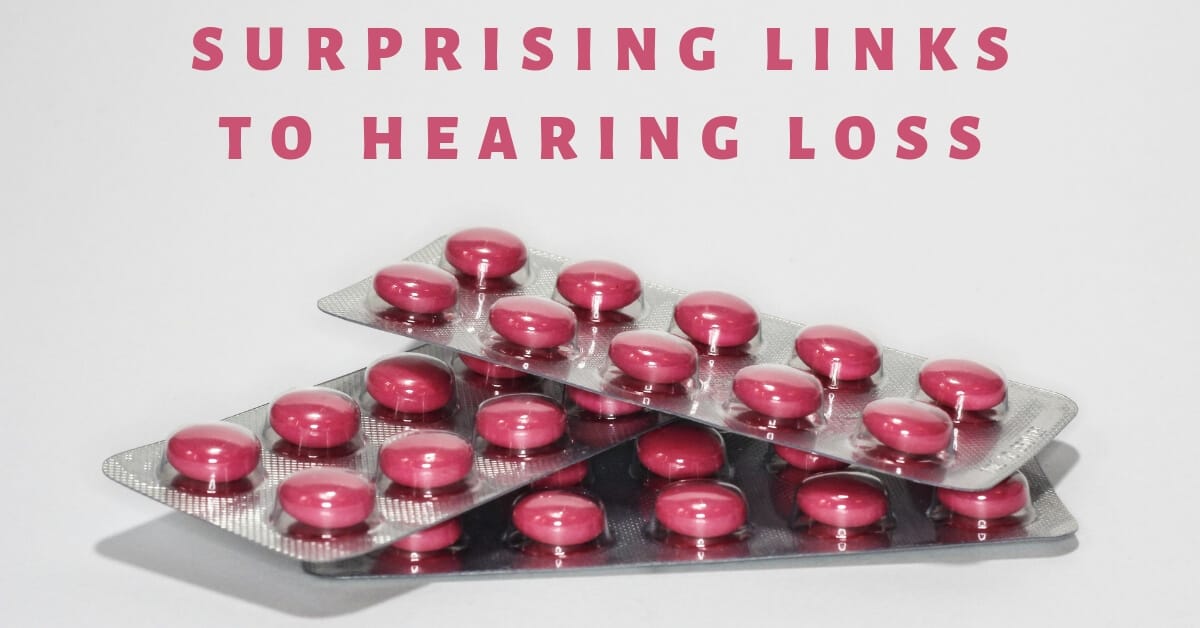
- Common Misconceptions That Delay Hearing Loss Diagnosis - June 6, 2025
- Signs Your Earwax Buildup Needs Professional Attention - May 29, 2025
- Preparing for a Hearing Test and What You Should Bring - May 16, 2025
We all know that hearing loss affects many seniors. In fact, roughly half of seniors over the age of 75 have hearing loss. You also know that loud noises can damage hearing, and noise induced hearing loss causes hearing loss among adults, teens, and even children. However, there are a few surprising links to hearing loss that you might not know, and losing your hearing could happen in ways you weren’t expecting.
Pain Killers
When it comes to certain signs of hearing loss, people often turn a blind eye to their health concerns. “With some less common causes, patients ignore their symptoms, thinking they’re going to resolve themselves,” says Felipe Santos, M.D., an assistant professor of otolaryngology at the Harvard Medical School. “Often we miss opportunities for treatment, or the outcome could’ve been better if they had been evaluated sooner.”
Did you know that some over the counter pain killers can harm your hearing? Acetaminophen, such as Tylenol, and ibuprofen like Advil, and even Aspirin have been linked to hearing loss and tinnitus. Taking these medications even a few times a week to relieve pain can have a negative impact on your hearing health, interfering with blood flow to the ears, and causing cell damage and hearing loss. Always consult your doctor when taking medications, and be mindful of your hearing health.
Infections
Both bacterial and viral infections can cause hearing loss, and can permanently damage the delicate cells in your ears. Unlike gradual hearing loss, an infection can cause sudden hearing loss, and if you have an ear infection, its important you seek treatment as soon as possible, before your hearing is damaged. Ear infections aren’t the only ones to damage your ears, and if you have respiratory tract infection, you could also experience hearing loss.
Diabetes
Do you or a loved one have diabetes? You’re more likely to have hearing loss than someone with normal glucose levels. In fact, if you have diabetes, you’re twice as likely to have hearing loss. “Small blood vessels that supply the inner ear can be affected in conditions like diabetes,” Santos explains, and damage to the cells in the ear causes permanent hearing loss. Having a healthy diet, and eating a wide range of fruits and vegetables, will help you manage your diabetes, and reduce your risk of hearing loss.
High Blood Pressure
Those with high blood pressure also risk a greater chance of hearing loss, and high cholesterol levels have been linked to hearing loss. Exercising and avoiding red meat will lower blood pressure levels, and protect the delicate cells of your inner ear.
Smoking
Did you know that smoking has been linked to hearing loss? We all know that smokers have a higher risk of developing cancer, but that’s not all they face. Smoking interferes with your cells ability to carry oxygen through the blood, and when your ears aren’t receiving fully oxygenated blood, they can be damaged or even die. A recent study found that regular smokers were one and a half times more likely to suffer from high-frequency hearing loss, or hearing loss that affects high pitched sounds like the voices of women and children.
Earwax
Sometimes hearing loss is reversable. If you’ve been struggling to hear, it might be worth your while to take a look inside your ears. Often, earwax can cause a blockage in your ear, making sounds seem muffled or distant. Cleaning your ears with a Q-tip will actually push the earwax further into your ears, so visit your doctor and have your ears flushed with water to remove the impacted earwax.
Hearing Aid Specialists of the Central Coast
The best way to protect your hearing is to be mindful of your environment, and avoid loud sounds. Pay attention to your body, and if you’ve noticed any changes to your hearing, whether due to infection, illness, or earwax, visit your doctor right away. Some of the causes of hearing loss may surprise you, so be vigilant when it comes to your health.
At Hearing Aid Specialists of the Central Coast, we’re dedicated to looking after your hearing health. Our team of hearing health specialists will work with you to find the perfect device that will help you hear in any listening environment, and give you back the confidence of clear hearing.
